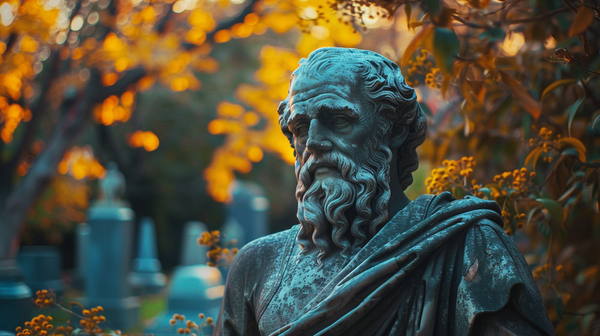In this blog post, we delve into a profound Stoic philosophy: the dichotomy of control. Through this guided meditation, you'll learn to navigate negative situations and incorporate this timeless wisdom into your daily life.
🎧 Listen to the Death Meditation
📖 Read Through the Death Meditation
Understanding the Dichotomy of Control
The Stoics believed that some things are within our control and others are not. Epictetus, a great Stoic philosopher, said, "Some things are within our power, while others are not." Our internal world, including judgments, impulses, desires, aversions, and mental faculties, is largely our responsibility. We control our goals, intentions, and conscious decisions.
Conversely, our body, health, material possessions, the external world, and other people's opinions are beyond our control. When we fixate on these externals, we become slaves to them, as our emotions depend on factors beyond our influence. Drawing strength from within and focusing on what we can control leads to true freedom.
Marcus Aurelius wrote, "You have power over your mind—not outside events. Realize this, and you will find strength." By practicing the techniques in this meditation, you can free yourself from hatred and resentment, ensuring that your life revolves around your decisions and actions.
Exercise: Sit with Your Fear of Death
Many philosophers argue that the root cause of all anxieties is the fear of death. Overcoming this fear can diminish other anxieties. The first step is to sit with this fear and familiarize ourselves with it.
Seneca reminds us, "He who fears death will never do anything worthy of a living man." Let's start by reflecting on your life in its entirety.
Visualizing Your Life
Consider the details that make you unique:
- Friends and family members
- Work and passions
- Good and bad habits
- Dreams, aspirations, and stressors
- Talents and gifts
- Memories, favorite foods, and dislikes
All these details will eventually fade into oblivion upon your death. Even if someone spent every day with you, they would never fully understand your unique experience. This story, your story, will eventually end.
Epictetus said, "It's not what happens to you, but how you react to it that matters." Reflect on this as we proceed.
Imagining Different Timeframes
- Ten Years Left: Imagine you have ten years left to live. How would you spend the next decade? Would you do anything differently? Would you fear the approaching death?Sit with this idea and be mindful of your breath as you contemplate your death in ten years.
- One Year Left: Death can occur anytime. Statistically, you could die within the next year. How would that make you feel? How would you spend the next year? What would you change or keep the same?Consider these questions deeply.
- One Day Left: Now, let's increase the intensity. Imagine you have only one day left. Think about the stresses and anxieties you have. What do they mean knowing your life will end today? Are you happy with the life you've lived so far? Would you live today differently?
Visualizing Your Own Death
Imagine you have died. Look down at your body and see it starting to decay. Flesh, blood, and bone will degrade into the earth. Bones will turn to dust and be blown away in the wind. How do you feel looking at your body?
Marcus Aurelius reminds us, "Consider that before long you will be nobody and nowhere, nor will anything which you now behold exist, nor one of those who are now alive." Contemplate this truth without fear, recognizing it as part of nature.
Death as Non-Existence Before Birth
Think about death as being identical to the state before you were born. Try to picture this state of non-existence. How did you feel then? Were you afraid or unhappy? If not, why would you be about the end of life as you know it now?
Seneca wrote, "Death is a release from all suffering." Reflect on this and find peace in the natural cycle of life and death.
Filling Your Heart with Love
Before we end this visualization, fill your heart with love. Think of someone in your life with whom you have an easy relationship. Wish them well, wish them happiness, success, health, and safety.
Marcus Aurelius said, "When you arise in the morning think of what a privilege it is to be alive, to think, to enjoy, to love." Let this love fill you as we conclude our meditation.
Combining Compassion with Contemplation
It's important to mix compassion with the difficult work we do on anxiety. The opposite side of death is love, not life. Reflect on this truth as you go forward.
Conclusion
Thank you for practicing with me today. Remember, this meditation is not just an exercise but a way to live a life of tranquility, reason, and resilience. May you find strength in focusing on what you can control and peace in accepting what you cannot.
Epictetus said, "Make the best use of what is in your power, and take the rest as it happens." Carry this wisdom with you.
This is the end of the meditation. Have a serene and thoughtful day.
